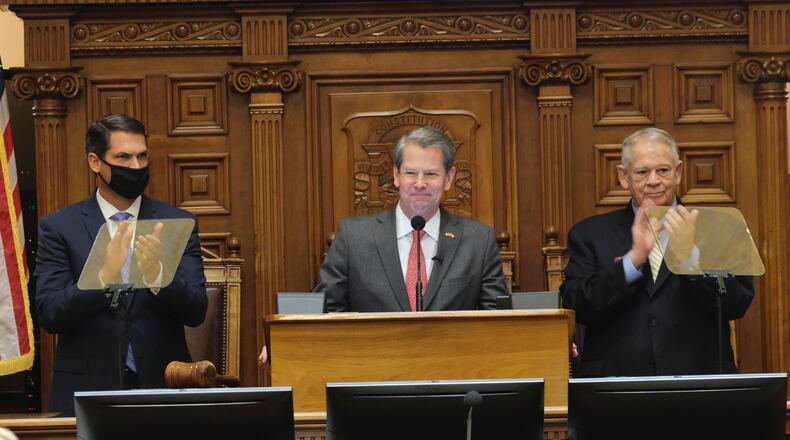Not long after Gov. Brian Kemp finished his State of the State address, Republican state Rep. Phil Singleton took a moment outside the House chamber to marvel at what he had just heard.
Over the course of his roughly 3,300-word speech, Kemp outlined an agenda that doubled as a wish list for his party’s right flank: An expansion of gun rights. New tough-on-crime policies. Opposition to coronavirus restrictions. And a fresh culture war over education policy.
“If we can get this agenda through the House,” Singleton said, “it might be the most conservative legislative session in my lifetime.”
Those are not empty words from Singleton, a leader of the secretive far-right Georgia Freedom Caucus. But he said Kemp, the state’s first lifelong Republican governor, is listening to the “growing grassroots movement” as he seeks a second term.
The governor’s deep dive into Georgia’s $3.7 billion budget surplus to finance salary hikes and tax refunds will help shape his reelection battle, giving him crowd-pleasing issues to amplify in November against Democrat Stacey Abrams.
And soaring tax collections — bolstered by federal relief funds sent to Georgians under President Joe Biden’s coronavirus relief measure — allow Kemp to unveil a record spending plan even while assailing the “radical socialist” Democrats who backed the package.
But first he’s got to win the GOP nomination. And with former U.S. Sen. David Perdue in the race — and former President Donald Trump still vowing payback against the governor — Kemp is scouring for new ways to court conservative voters before the May primary.
The most controversial item might be Kemp’s pledge to sign legislation that lets Georgians carry concealed handguns without a permit. It heralds the most significant state debate over firearms expansion in years, one that could possibly render other gun restrictions moot.
Not surprisingly, it also became a unifying point for Democrats who say the state should be limiting where people can carry deadly weapons.
Credit: Hyosub Shin/AJC
Credit: Hyosub Shin/AJC
“The governor is more concerned with getting guns in the hands of people than vaccines in the arms of citizens,” said state Rep. James Beverly, the top Democrat in the House.
“Is it right for the governor to hold us all hostage with these egregious gun laws just so he can feel competitive in the primary?” Beverly asked.
The pro-gun proposal alone would spark the sort of fight that would dominate other legislative sessions. But Kemp is willing to wage a culture war on other fronts, namely in the classrooms and courtrooms.
His criminal justice agenda, with its call for new corrections spending and critique of “soft on crime” prosecutors, is a stark departure from eight years of policy from Gov. Nathan Deal that aimed to reduce the state’s prison population and veered from tough crackdowns.
Kemp wants to step up prosecution of gang offenders, train an additional Georgia State Patrol class of 75 cadets and recruit 1,000 more law enforcement officers with the promise of a tuition-free education.
Credit: Jenni Girtman
Credit: Jenni Girtman
School policy could get a GOP-tinged overhaul. Kemp plans to ban the teaching of critical race theory, which has become a favorite punching bag on far-right media outlets though there’s no evidence it’s being taught in k-12 schools in Georgia.
He also wants legislation to block “obscene” materials online and in public school libraries, which has raised concerns it could be used to censor certain books dealing with topics of race and gender.
And for the first time, Kemp signaled support for an effort to ban transgender women and girls from playing on female teams in high school, which he said would “ensure fairness in school sports.”
Each of these ideas drew howls from Democrats.
“The governor made clear today that Georgia schoolkids are his newest political football,” Democratic state Rep. Matthew Wilson said. “The only reason why he’s leaning into far-right conspiracy theories about CRT and transgender athletes is because he lost President Trump’s endorsement.”
Perdue would probably agree. His campaign blasted Kemp even before his speech for an “election-year spending spree to try and make up for broken promises.”
But while Perdue’s challenge helped pull Kemp to the right, the governor might have pursued many of these policies regardless. After all, he had to persuade Trump supporters to return to his camp despite the former president’s vow to defeat him.
Cole Muzio, a close Kemp ally who leads Frontline Policy Action, predicted the speech offered a glimpse at a more combative and feisty governor.
“It’s the most conservative State of the State I’ve heard,” he said. “Usually, these speeches are focused on the budget and not ideology. But his language was clear. He’s throwing down the gauntlet. The governor is ready to fight back.”
About the Author
The Latest
Featured







